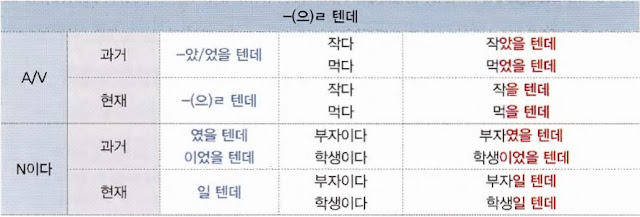가: 바람이 많이 부네요.
It’s really windy.
나: 바람이 불면 추울 텐데 따뜻하게 입고 가는 게 좋겠어요.
If it’s windy, it should be cold, so it’s good to wear warm clothes when going out.
가: 웨이밍 씨가 오늘 동창회에 온대요?
Did Wei Ming say she would come to the alumni meeting today?
나: 모르겠어요. 벌써 초대장을 받았을 텐데 연락이 없네요.
I’m not sure. She should have received the invitation, but I haven’t heard from her yet.
This expression is a combination of -(으)ㄹ 터아다,which expresses a particular future situation or intention to do something, and (으)ㄴ/는데, which expresses the background situation or state of affairs related to what is to follow in the sentence. As such, it is used to express an expected or intended future state of affairs. In the first clause of the sentence, a strong intention or expectation about a future event or situation is given, and in the second clause (following -(으)ㄹ 텐데) a statement either related or contrary to the first clause is given.

가: 시험공부를 안 해서 큰일이에요.
I’m in big trouble because I haven’t studied for the exam.
나: 저도요. 시험을 못 보면 진급을 못할 텐데 걱정이에요.
Me too. If we don’t do well on the test, we won’t advance (to the next tevel/grade), so I’m worried.
가: 저녁에 택배가 하나 오는데 좀 받아 주세요.
I’m expecting a delivery this evening, so please make sure that you receive it
나: 저도 저녁에는 집에 없을 텐데 어떡하지요?
But I also don’t expect to be home this evening, so what should we do?
가: 어제 야근하느라고 많이 피곤했을 텐데 오늘은 일찍 들어가세요.
You must be exhausted after working late yesterday, so please go home early today.
나: 괜찮습니다. 오늘도 야근할 수 있습니다.
It’s okay. I can work late today, too.
This expression can also be used at the end of a sentence in the form -(으)ㄹ 텐데요 but, in this case, it can also express the speaker’s supposition or assumption about the situation being discussed.
가: 제나 씨에게 같이 여행 가자고 할까요?
Shall we ask Jena to go on the trip with us?
나: 제나 씨는 요즘 바쁠 텐데요.
I think Jena is busy these days.
가: 경수 씨가 요즘 시험 준비하느라 바쁘대요.
I heard Gyeongsu is busy trying to prepare for his exam.
나: 이번에는 꼭 합격해야 할 텐데요.
He really has to pass this time.
가: 태풍이 와서 비행기가 모두 취소되었어요.
All the flights were canceled because of the typhoon.
나: 태풍이 오지 않았더라면 비행기가 취소되지 않았을 텐데요.
They wouldn’t have been canceled if there hadn’t been a typhoon.
The differences between -(으)ㄴ/는데 and -(으)ㄹ 텐데 are summarized below.

>> You can click on the title of each grammar below to learn the other grammar that also expresses ‘Conjecture and Supposition’:
01. -아/어 보이다
02. -(으)ㄴ/는 모양이다
03. -(으)ㄹ 텐데
04. -(으)ㄹ 테니까
05. -(으)ㄹ걸요
06. -(으)ㄴ/는/(으)ㄹ 줄 몰랐다[알았다]
07. -(으)ㄹ지도 모르다
>> Full of Intermediate grammar: Click here

